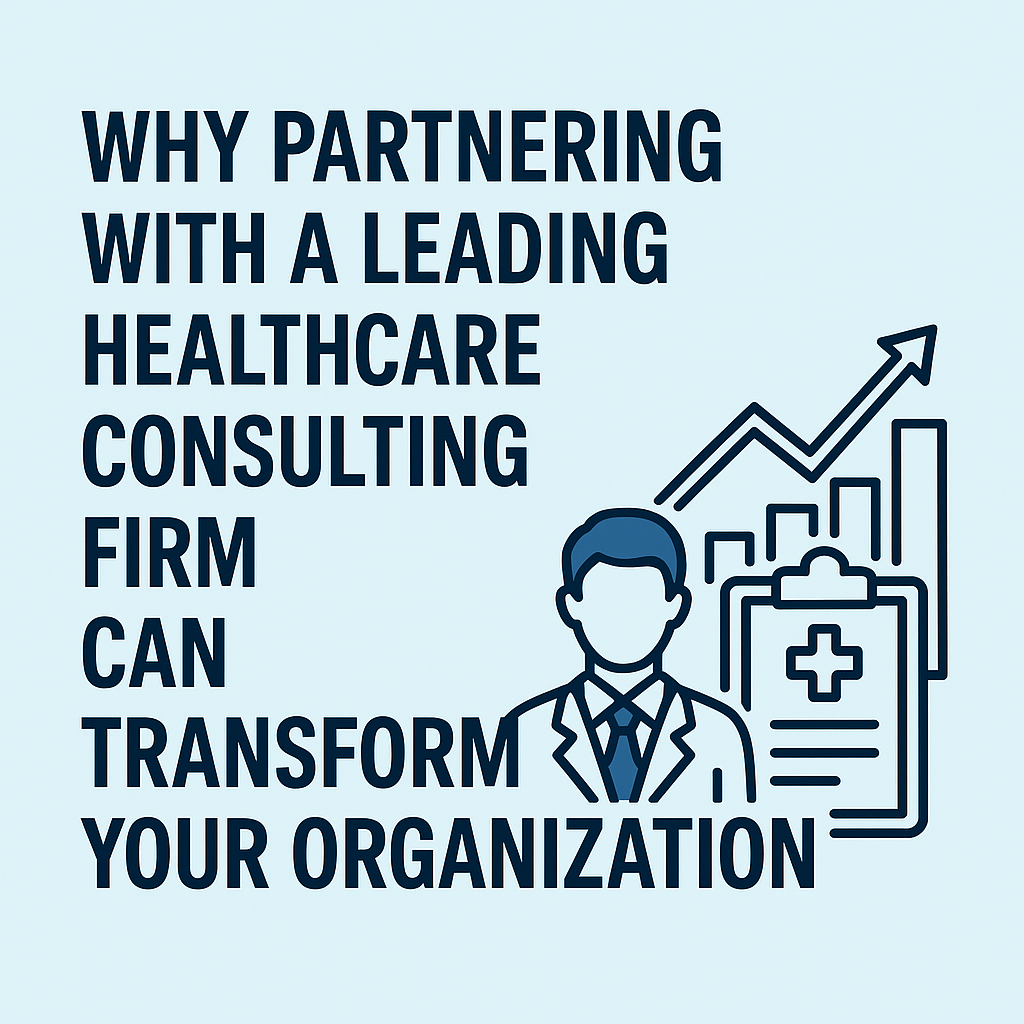Why Partnering with a Leading Healthcare Consulting Firm Can Transform Your Organization

In today’s ever-evolving medical landscape, the pressure on healthcare organizations to deliver exceptional care while maintaining cost-efficiency and regulatory compliance is immense. From shifting patient expectations to stringent regulations and complex technology integrations, providers face a labyrinth of challenges. That’s where the right partnership can make all the difference. Collaborating with a top-tier healthcare consulting firm isn’t just an option—it’s a strategic necessity.
A healthcare consulting partner brings more than just advice; they offer a blueprint for sustainable growth, operational excellence, and transformative change. These firms have the experience, tools, and insider knowledge to guide healthcare organizations through turbulent times, helping them not only to survive but to thrive.
When an organization chooses to work with a healthcare consulting firm, it opens the door to a wealth of expertise that spans across clinical, operational, financial, and technological disciplines. The benefits are vast and measurable, whether you’re a small clinic looking to scale or a large hospital network aiming to optimize system-wide efficiency. Let’s dive into the ways such a partnership can catalyze lasting, impactful transformation.
1. Strategic Clarity and Vision Alignment
Healthcare consulting firms excel at helping organizations identify their long-term goals and align all departments toward achieving them. Often, internal teams are caught in the day-to-day grind, lacking the time or perspective to think strategically. Consultants bring a fresh, outsider’s view that challenges the status quo and facilitates clear, actionable planning.
With the help of seasoned professionals, leadership can assess market conditions, competitor positioning, and internal capabilities to create a roadmap that’s both ambitious and achievable. This strategic clarity not only guides decision-making but also enhances stakeholder buy-in, ensuring everyone from the C-suite to frontline workers understands and supports the organizational direction.
2. Financial Optimization and Revenue Enhancement
One of the most immediate benefits of working with a healthcare consulting firm is the impact on the bottom line. These firms analyze existing financial structures to uncover inefficiencies, reduce waste, and optimize billing processes. Whether it’s through revenue cycle management, payer contract negotiation, or cost-reduction initiatives, they are laser-focused on driving financial health.
Consultants implement best practices that streamline operations without sacrificing patient care. From improving billing accuracy to reducing denied claims, these changes translate into real dollars saved or earned. In today’s cost-sensitive environment, even minor financial improvements can result in substantial gains over time.
3. Improved Patient Experience and Care Quality
The patient journey has transformed, with today’s healthcare consumers expecting seamless, personalized, and high-quality care experiences. A healthcare consulting firm can help elevate the patient experience by identifying pain points and implementing patient-centric models. This often involves training staff, redesigning workflows, and integrating new technologies that promote better communication and care coordination.
By focusing on quality metrics and patient satisfaction scores, consultants ensure that the care delivered is not only clinically effective but also emotionally supportive. This dual focus enhances brand reputation, increases patient retention, and boosts overall satisfaction—key indicators in a value-based care world.
4. Regulatory Compliance and Risk Management
Healthcare is one of the most heavily regulated industries, and staying compliant is non-negotiable. Regulations around data privacy, billing practices, and clinical procedures can be daunting, particularly as they vary by region and evolve frequently. Failure to comply can result in fines, lawsuits, or even license revocation.
A consulting partner ensures your organization remains up-to-date with current laws and standards. They conduct risk assessments, prepare for audits, and implement compliance programs that reduce exposure to legal and financial liabilities. This proactive approach not only protects the organization but also fosters a culture of accountability and ethical practice.
5. Digital Transformation and Technology Integration
Incorporating the latest healthcare technologies can significantly improve outcomes and efficiency, but digital transformation isn’t just about implementing new software. It’s about aligning people, processes, and systems in a way that maximizes value. From electronic health record (EHR) integration to telehealth solutions and data analytics platforms, consulting firms ensure that tech investments yield real returns.
These experts assess your current tech stack, recommend scalable solutions, and guide you through implementation without disrupting daily operations. They also train staff and set up support systems to foster long-term adoption. The result is a more connected, data-driven, and future-ready healthcare environment.
Visit https://www.attacconsulting.com/ for insights on how these transformations are being driven across the industry.
6. Workforce Optimization and Leadership Development
People are the heartbeat of any healthcare organization. Ensuring your team is engaged, skilled, and aligned with organizational goals is critical. Consultants assess workforce capabilities, identify skill gaps, and develop leadership programs that build internal capacity.
They may recommend restructuring departments, redesigning roles, or upskilling current staff to better meet emerging demands. Additionally, they can create customized leadership development plans to nurture future executives and managers. A well-supported workforce not only performs better but also stays longer, reducing turnover and boosting morale.
7. Change Management and Organizational Culture
Transformational initiatives often fail not because they are flawed but because they are resisted. Change is hard—especially in healthcare, where routines and hierarchies are deeply embedded. A consulting firm can guide organizations through change management with strategies that encourage buy-in, reduce resistance, and build a positive culture of adaptability.
They employ frameworks such as Kotter’s 8-Step Process or the ADKAR model to ensure changes are not only initiated but sustained. This includes frequent communication, stakeholder involvement, and measurable milestones. In the long term, fostering a culture of innovation and continuous improvement makes the organization more resilient and agile.
8. Data Analytics and Performance Monitoring
Data is the lifeblood of modern healthcare. But raw data means nothing without proper interpretation. Consultants use advanced analytics tools to transform data into actionable insights. Whether it’s tracking hospital readmission rates, identifying high-cost patients, or monitoring quality metrics, these insights drive smarter decisions.
With dashboards and reporting systems in place, leaders can track progress in real-time and make informed decisions quickly. Performance monitoring also allows for proactive issue resolution and continuous improvement, enhancing operational transparency and accountability.
9. Tailored Solutions for Unique Challenges
Every healthcare organization is different. What works for a metropolitan hospital system may not suit a rural clinic. Leading consulting firms don’t apply a one-size-fits-all approach. Instead, they customize their strategies based on your specific needs, goals, and market dynamics.
This individualized attention ensures that recommendations are not only relevant but also practical. Whether your facility needs help with supply chain management, outpatient care coordination, or telemedicine integration, a tailored solution ensures better results. Consultants also work collaboratively with internal teams to foster ownership and ensure the smooth adoption of new practices.
10. Accelerated Innovation and Competitive Advantage
Staying ahead in the healthcare field means being innovative. But innovation is hard to sustain without the right framework. Consulting firms bring tested methodologies and forward-thinking strategies that help healthcare providers innovate faster and more effectively. From piloting new care models to integrating AI and machine learning, consultants help organizations stay ahead of the curve.
This drive toward innovation is not just about adopting the latest trend. It’s about building a long-term competitive advantage that positions the organization as a leader in its field. Being first to adopt and optimize emerging technologies or care protocols can enhance patient outcomes and improve operational efficiency.
11. Enhanced Community and Stakeholder Engagement
Hospitals and clinics are more than service providers; they are cornerstones of their communities. A reputable healthcare consulting partner helps you strengthen community engagement strategies, ensuring your organization is seen as a trusted ally in health and wellness.
Through programs that involve patients, local health agencies, and nonprofit partners, consultants guide you in building a collaborative ecosystem. Enhanced stakeholder relationships not only improve community health outcomes but also increase your organization’s influence and trustworthiness.
12. Crisis Management and Business Continuity
From pandemics to cyberattacks, the healthcare industry is vulnerable to sudden disruptions. Leading consulting firms bring valuable expertise in emergency preparedness and business continuity planning. They help you assess vulnerabilities, develop rapid response protocols, and ensure systems are resilient under stress.
Whether it’s setting up telehealth quickly during a health crisis or restoring operations after a data breach, consultants enable you to bounce back faster and stronger. Having a solid crisis management plan minimizes risk and demonstrates leadership during uncertain times.
13. Seamless Mergers, Acquisitions, and Expansions
Healthcare systems often pursue growth through mergers, acquisitions, or partnerships. But these endeavors come with significant challenges—operational integration, cultural alignment, financial due diligence, and more. Consultants offer the experience and tools to navigate these transitions smoothly.
They manage timelines, facilitate communication, and resolve potential conflicts, ensuring that the merger or acquisition is value-adding rather than disruptive. Their involvement can also accelerate the realization of synergies, boosting ROI and strategic impact.
14. Streamlined Supply Chain and Procurement
An often overlooked area of healthcare operations is the supply chain. Yet, inefficiencies here can lead to major cost overruns and care delivery issues. Consultants examine your procurement systems and vendor relationships, identifying ways to reduce costs and increase reliability.
By leveraging group purchasing organizations, automating inventory management, and improving vendor negotiations, firms help you build a lean, responsive supply chain. This ensures you’re not only getting the best prices but also maintaining adequate supplies without overstocking.
15. Sustainable Growth and Future Readiness
Perhaps the most critical value of a healthcare consulting firm is its focus on sustainability. In a rapidly changing environment, short-term wins mean little without long-term resilience. Consultants help design systems, strategies, and cultures that grow with you.
They don’t just offer temporary fixes—they embed capabilities within your organization, empowering your people to lead the next wave of improvements. With the right consulting support, your organization is not only prepared for the future—it’s actively shaping it.
Conclusion
Partnering with a healthcare consulting firm is more than a tactical move—it’s a transformative decision. With the right expertise, your organization can unlock new levels of efficiency, quality, and innovation. From fine-tuning operations and improving patient care to navigating complex changes and preparing for the future, a consulting partnership paves the path to success.
Now more than ever, healthcare providers need a trusted ally who understands the nuances of the industry and can guide them with clarity, strategy, and compassion. The right consulting firm can be that catalyst—empowering your organization to go further, faster, and with purpose.


